Are you investing in TikTok ads but struggling to see which ad is generating your leads, sales, and revenue?
You may be tracking the total leads from your TikTok ads, but can’t view the individual leads.
Not knowing which TikTok ad led to conversions makes it harder to manage and optimize your ad budget.
Leadsources completely resolves this issue.
Leadsources tracks every lead’s TikTok ad data (campaign, ad group, ad) comprehensively.
You can then store TikTok ad data for every lead in Fillout.
Create reports, like “Ads that brought in the highest sales or revenue,” to figure out which ads to promote or stop.
Let’s get started!
Capture TikTok ads in Fillout
Step 1: Add Leadsources in the head tag of your website

Sign up to Leadsources.io for free (benefit from our 14-day free trial).
Place the Leadsources script in the head portion of your webpage.
No code is necessary, follow this easy step-by-step guide.
Step 2: Add the UTM parameters to your TikTok campaigns

Attach UTM parameters to your TikTok ads to keep track of important data (campaign, ad group, ad).
For example, apply these UTM parameters to the links featured in your TikTok ads:
- UTM_medium=paidsocial
- UTM_source=tiktok
- UTM_campaign=campaign-name
- UTM_term=ad-group-name
- UTM_content=ad-name
The final URL should ideally look like this:
https://www.yoursite.com/?UTM_medium=paidsocial&UTM_source=tiktok&UTM_campaign=campaign-name&UTM_term=ad-group-name&UTM_content=ad-nameDon’t forget that Leadsources captures lead source information even without UTM parameters. It tracks key details such as channel, landing page, and landing page subfolder for a comprehensive view of lead origins.
Step 3: Add the hidden fields in Fillout
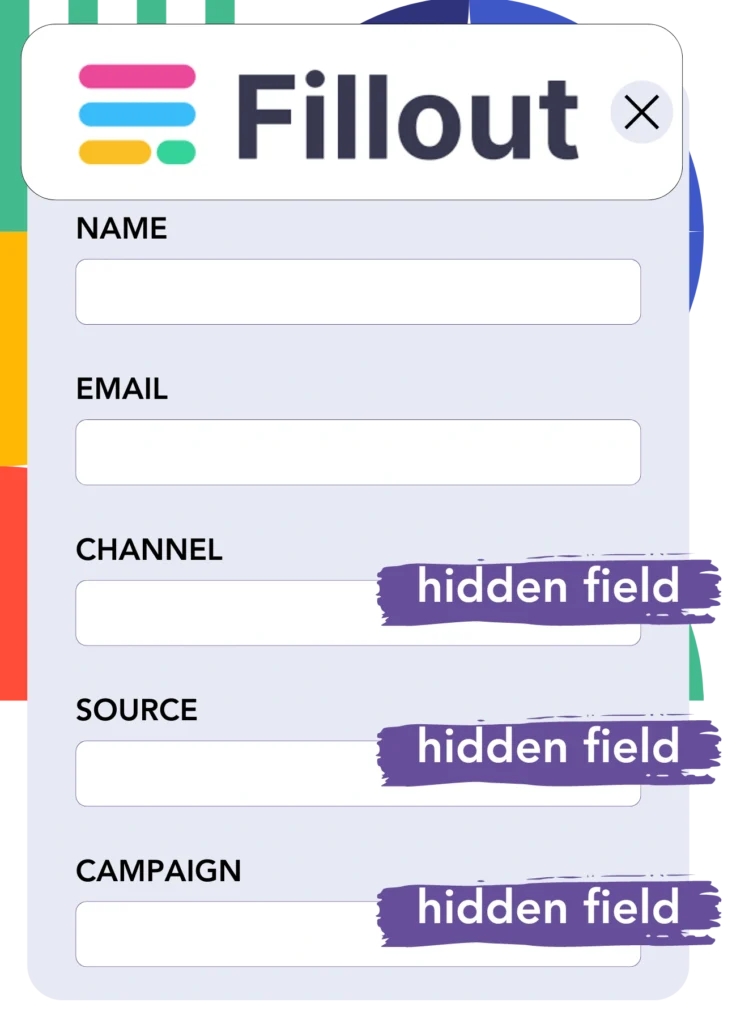
When someone completes your Fillout form, Leadsources automatically updates the hidden fields with the associated TikTok ads data (campaign, ad group, and ad).
Check our detailed guide on how to add hidden fields in Fillout to successfully complete your setup.
Leadsources then securely saves the TikTok ads data in your Fillout form (consult Step 4 for instructions).
Step 4: Capture the TikTok ads data in Fillout
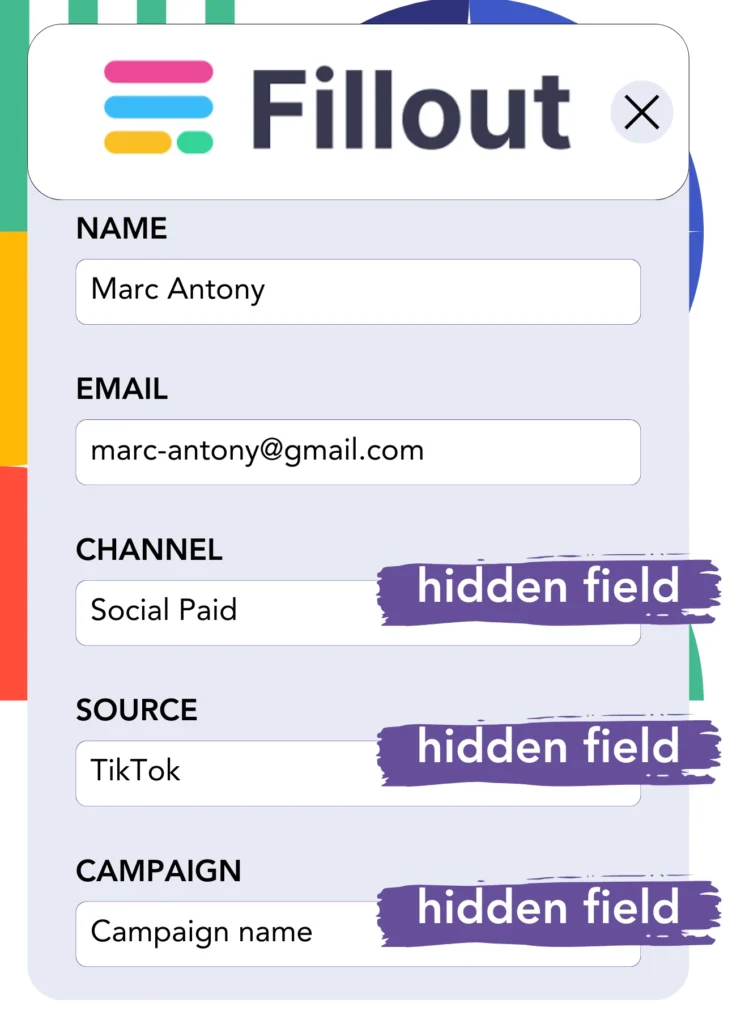
Leadsources compiles TikTok ad data (campaign, ad group, and ad) when a user clicks your TikTok ad and accesses your website.
The hidden fields in your Fillout form are automatically filled with TikTok ads data by Leadsources.
Once the form is submitted, the TikTok ads data, along with the form’s responses, is transmitted to the Fillout submissions page for each generated lead.
How does Leadsources work?
By implementing the Leadsources script on your website, you can capture TikTok ads data (campaign, ad group, ad) whenever a visitor comes to your page.
The information is directly saved in the hidden fields of your Fillout form without any extra steps.
Leadsources will survey the following visitor specifics:
- Channel
- Source
- Campaign
- Content
- Term
- Landing page
- Landing page subfolder
This allows you to recognize key lead sources even when UTM parameters are not included, such as traffic from organic sources like:
- Google Search
- Instagram bio link
- Social media posts
- Etc.
Although many tools rely on UTM parameters for capturing lead data, Leadsources excels without them, ensuring complete tracking of lead sources.
Leadsources captures lead data from all possible channels, such as:
- Organic Search
- Paid Search
- Organic Social
- Paid Social
- Referral
- Affiliate
- Display Advertising
- Direct Traffic
This allows you to facilitate all lead source information into a single area for simpler tracking and analysis.
Pro tip:
Track TikTok ads in your favorite online form builder, including Cognito Forms, Gravity Forms, Jotform, Typeform, or WPForms. Using another online form builder? Check our guide on how to track TikTok ads in your form.
How to run performance reports
Now that your TikTok ads information has been secured in Fillout, you can generate performance reports like:
- Leads, sales, and revenue by channel
- Leads, sales, and revenue by source
- Leads, sales, and revenue by campaign (aka. Tiktok campaign)
- Leads, sales, and revenue by term (aka. Tiktok ad group)
- Leads, sales, and revenue by content (aka. TikTok ad)
- Leads, sales, and revenue by landing page
- Leads, sales, and revenue by landing page subfolder
This helps you to optimize your TikTok budget decisions for better results.
Now, let’s explore the variety of reports you have the option to generate.
1. Lead performance reports
You can generate reports that track the leads generated by:
- Channel
- Campaign
- Ad group
- Ad
- Landing page
- Landing page subfolder
Example #1: Leads by channel
This report helps you evaluate which channel is the primary source of your leads.
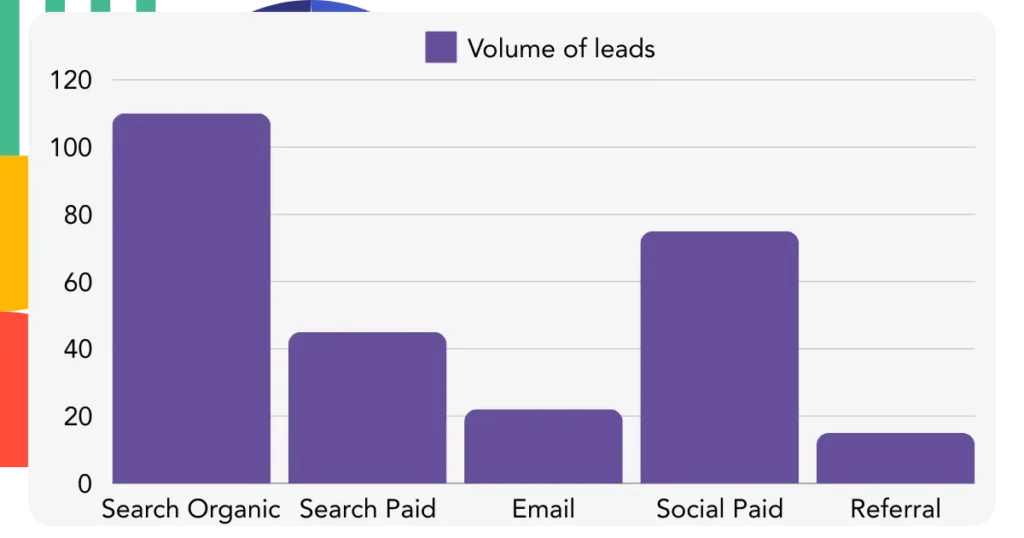
Example #2: Leads by TikTok campaign
Focus on a particular lead source, such as TikTok, and evaluate how many leads each campaign generates.
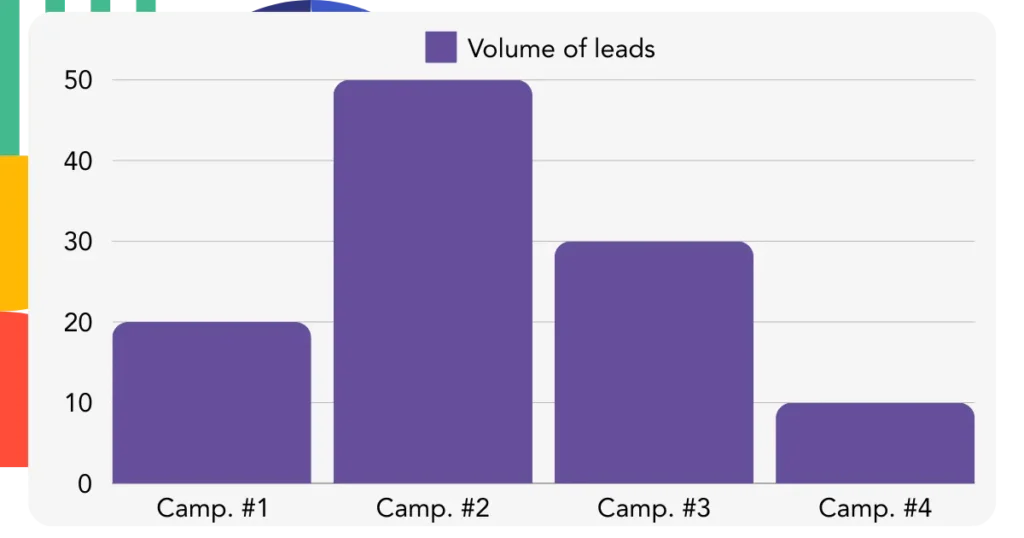
Example #3: Leads by TikTok ad
After isolating the TikTok campaign that generates the most leads, you can examine which specific ad group or ad contributes to that success.
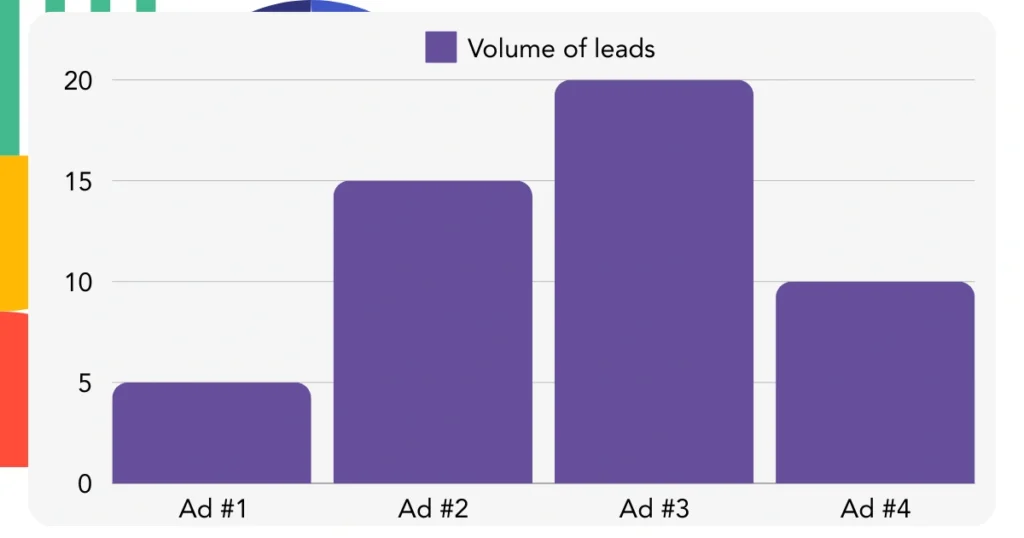
2. Sales performance report
Determining the TikTok ads and audiences that bring in the most leads is important. However, do these leads also correlate with your sales and revenue?
When you incorporate your Fillout data into a CRM like GoHighLevel, you can see which leads convert into paying customers. This helps you generate sales reports based on your TikTok ads data (campaign, ad group, ad).
Take note of this illustration:
| Channels | Search Paid | Social Paid |
| Leads | 50 | 75 |
| Sales | 5 | 6 |
| Average order value | $150 | $100 |
| Revenue | $750 | $600 |
Following the review of your Google and TikTok campaigns, the initial “Leads by Channel” report pointed out that TikTok Social Paid ads were more successful in generating leads than Google Search Paid ads.
However, after inspecting your CRM-exported sales and revenue figures, you found that the Search Paid channel achieved higher revenue even though it had fewer leads than the Social Paid channel. This indicates a potential avenue to increase the Search Paid budget.
Additionally, you can prepare different reports to investigate sales and revenue performance with greater clarity, such as:
- Sales and revenue by source
- Sales and revenue by campaign
- Sales and revenue by content (aka. ad)
- Sales and revenue by term (aka. audience)
- Sales and revenue by landing page
- Sales and revenue by landing page subfolder
LeadSources tracks the source of each lead in Fillout, whether they come from ads, organic search, social, email, etc. and syncs that data with each submission. See the full breakdown on the lead source in Fillout page.

